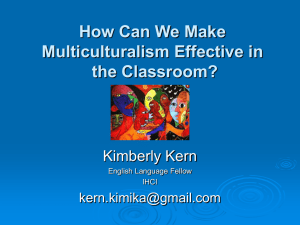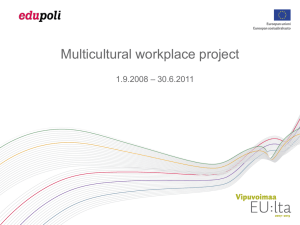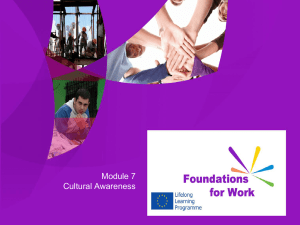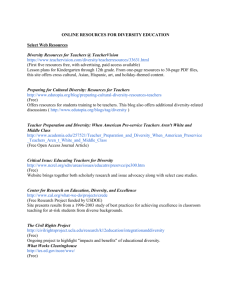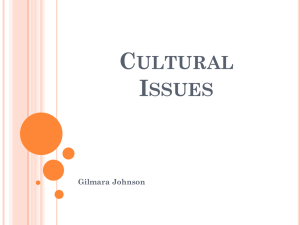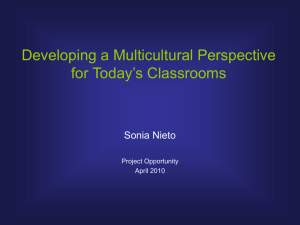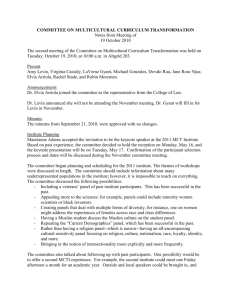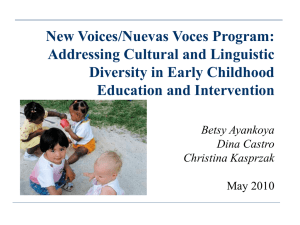Multicultural Competency Paper
advertisement
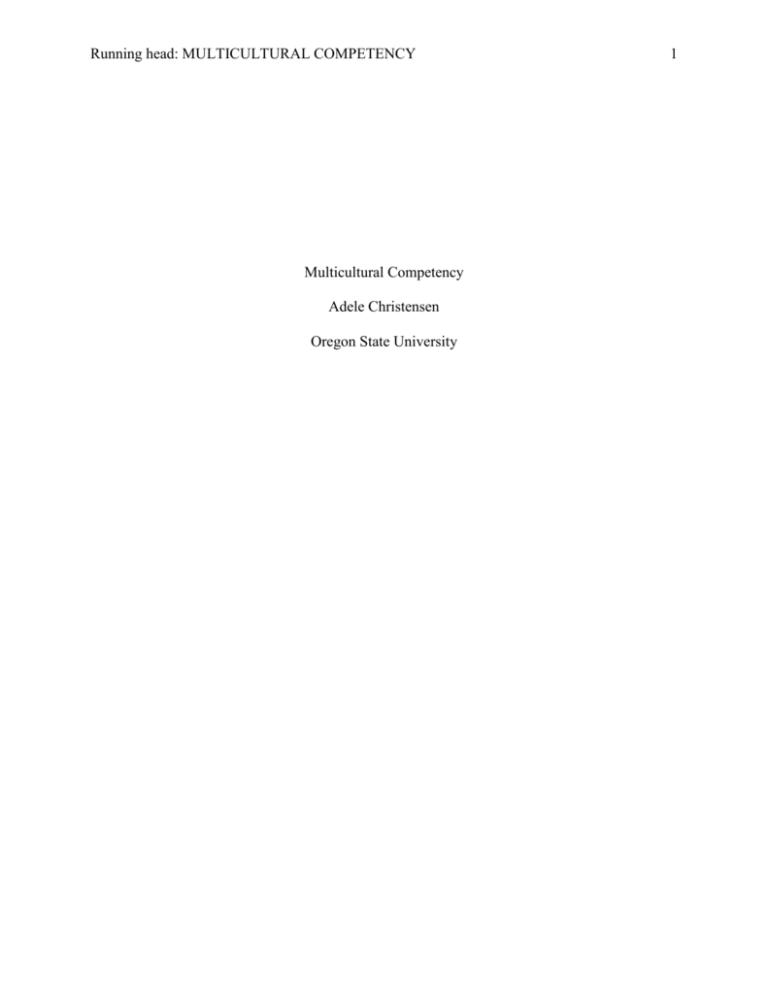
Running head: MULTICULTURAL COMPETENCY Multicultural Competency Adele Christensen Oregon State University 1 MULTICULTURAL COMPETENCY 2 Multicultural Competency As student affairs professionals it is important to be self-aware and intelligent within a multicultural setting since we work with a variety of students every day. This essay will address my thoughts and feelings about the Multicultural Counseling Competencies framework, examine challenges for my personal growth in this area, and explore a scenario with multicultural implications in higher education including my experiences with such situations. I really appreciated reading the Multicultural Counseling Competencies framework because it was able to put into words specific goals counselors strive towards in order to best understand their cognitive bias and how it relates to others. The framework also addresses aspects of the ethical guidelines as discussed earlier in the term such as continuous education and training on subjects that require constant revisiting. I valued that the competencies were very explicit and detailed since the topic of multiculturalism can sometimes be described very vaguely; therefore making it difficult for professionals to grasp. An example of a statement that I found to be very helpful was, “Culturally skilled counselors are aware of their stereotypes and preconceived notions that they may hold towards other racial and ethnic minority groups” (Arredondo, P., Toporek, M. S., Brown, S., Jones, J., Locke, D. C., Sanchez, J. & Stadler, H., 1996). This statement helped me to validate that all people hold preconceived notions about groups but that it is important for the professional to put aside their thoughts and think about the personal holistically. While reading through the first two sections of the document I thought that parts of the framework were repetitive as there was a lot of mention of how different aspects of the counselors’ cognitive bias affect the client. While I understood the need for the competencies to be explicit, I thought that aspects were repeated many times. I do, however, see the value in MULTICULTURAL COMPETENCY 3 repetition so as to emphasize the importance of a particular topic but I thought it was a little too much. The biggest challenges of my growth in multicultural competence are self-education and a lack of understanding of the full potential of multicultural competency. At this point, I have just started to understand the concepts of cognitive bias and the privileges I possess. After starting to scratch the surface of multicultural competence, I feel like I do not know where to go from here. I am looking forward to having a class solely devoted to this subject next term so I can learn more about how I can improve myself. One thing I have learned about this area is that it is something I must do in self-reflection. I also know that education regarding multicultural competence is never-ending even though that is an unsettling feeling for me. I am looking forward to learning more about how I can improve myself and sensitivity towards multicultural issues. In residence life, my area of specialty within student affairs, I know that I will constantly need to be educating myself on the ever-changing student population since the majority of my work is with first year students. For example, there is a student who currently lives in my residence hall who identifies as an animal. My supervisor had attended a session at a conference last year that talked about students who may identify this way and they were named “furries”. Had my supervisor not heard about this before we would not have known that the student who walked around in an animal costume everyday was doing so as a way to demonstrate their identity. With new generations coming to college and living in residence halls, it is especially important for professionals in my functional area to be conscious of the nuances students bring each year. MULTICULTURAL COMPETENCY 4 A scenario which I could imagine encountering in higher education, particularly within residence life, would be related to students who have limited knowledge of people who are different from themselves. This is something that I worked through while attending college in Wisconsin. I had to work a lot with students who were naïve about the concept of people having different worldviews or cultural backgrounds than themselves. While not related to race or ethnicity, there were a lot of students I worked with as a Resident Assistant who had little tolerance for people who identified as LGBTQ. This atmosphere led to an unsafe campus and residence hall climate. Students who identified as LGBTQ did not feel safe being out or talking about coming out at my undergraduate campus. Something that added fuel to the fire was that some residence life staff (mostly undergraduate RAs) were not capable of offering support to these students when they wanted someone to talk with about coming out or other LGBTQ resources. These staff members would blatantly refuse to talk with students who had those issues thus making the student feel even more marginalized and unsafe in the community. It is a result of those experiences as well as others that have inspired me to focus my area of specialization for the program on effective ways to education students about social justice issues even if the concepts are against the students’ values. Multicultural competency is something with which I thought I was very familiar until I came to graduate school and learned that I have a long way to go. After understanding that one cannot “master” multicultural competence and that it is a continuous learning effort, I became more motivated to work on improving myself in that area. By being conscious of my own personal bias and current skills, I am able to understand the importance of the Multicultural Counseling Competencies framework as its relevance to my future in higher education. MULTICULTURAL COMPETENCY 5 Reference Arredondo, P., Toporek, M. S., Brown, S., Jones, J., Locke, D. C., Sanchez, J. and Stadler, H. (1996) Operationalization of the Multicultural Counseling Competencies. AMCD: Alexandria, VA.
